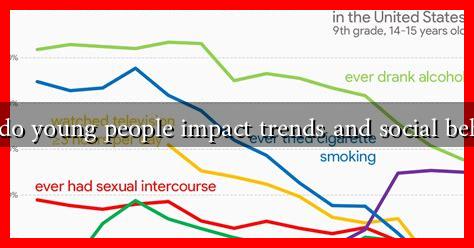-
Table of Contents
How Do Young People Impact Trends and Social Behavior?
In today’s fast-paced world, young people play a pivotal role in shaping trends and social behavior. Their influence extends across various domains, including fashion, technology, social media, and even political movements. This article explores how the youth demographic drives change and innovation, supported by relevant examples and statistics.
The Power of Social Media
Social media platforms have become the primary means of communication and expression for young people. With billions of users worldwide, platforms like Instagram, TikTok, and Snapchat allow youth to share their thoughts, ideas, and lifestyles, significantly impacting societal norms and trends.
- Viral Trends: Young people are often the first to adopt and spread new trends. For instance, TikTok has given rise to viral challenges and dances that can influence fashion and music trends almost overnight.
- Influencer Culture: Many young individuals aspire to become influencers, leveraging their platforms to promote brands and products. According to a report by Statista, the number of influencers worldwide is expected to reach 37.8 million by 2025.
- Social Movements: Young people have harnessed social media to advocate for social justice issues, such as climate change and racial equality. The #BlackLivesMatter movement gained significant traction among youth, showcasing their ability to mobilize and create change.
Fashion and Consumer Behavior
Young people are trendsetters in the fashion industry, often dictating what is considered stylish or desirable. Their preferences can lead to significant shifts in consumer behavior.
- Sustainable Fashion: A growing number of young consumers prioritize sustainability. Brands like Patagonia and Everlane have gained popularity among youth for their commitment to ethical practices.
- Fast Fashion vs. Vintage: While fast fashion brands like Zara and H&M have traditionally dominated the market, many young people are now gravitating towards vintage and thrift shopping, driven by a desire for uniqueness and sustainability.
- Brand Loyalty: Young consumers are more likely to support brands that align with their values. A survey by McKinsey found that 67% of Gen Z consumers prefer to buy from brands that demonstrate social responsibility.
Technology Adoption and Innovation
Young people are often early adopters of new technologies, influencing how these innovations are integrated into daily life.
- Mobile Technology: The rise of smartphones has transformed communication and information access. Young people are at the forefront of this shift, using mobile apps for everything from shopping to socializing.
- Gaming Culture: The gaming industry has exploded in popularity among youth, with games like Fortnite and Among Us becoming cultural phenomena. This has led to new forms of social interaction and community building.
- Cryptocurrency and NFTs: Young investors are increasingly interested in cryptocurrencies and non-fungible tokens (NFTs), driving trends in digital finance and art. A survey by Business Insider revealed that 43% of millennials and Gen Z have invested in cryptocurrency.
Political Engagement and Activism
Young people are not just passive consumers; they are active participants in political discourse and activism. Their engagement can lead to significant societal changes.
- Voting Trends: In recent elections, young voter turnout has increased significantly. For example, the U.S. Census Bureau reported that 50% of eligible voters aged 18-29 participated in the 2020 presidential election, a notable increase from previous years.
- Grassroots Movements: Young activists have spearheaded movements like March for Our Lives and Fridays for Future, advocating for gun control and climate action, respectively.
- Online Petitions: Platforms like Change.org have empowered young people to initiate and support petitions on various issues, demonstrating their ability to influence policy and public opinion.
Conclusion
Young people are a driving force behind trends and social behavior, leveraging their unique perspectives and platforms to create change. From shaping fashion and consumer habits to influencing technology adoption and political activism, their impact is profound and far-reaching. As society continues to evolve, the voices and actions of young individuals will undoubtedly play a crucial role in defining the future.
Understanding this dynamic is essential for businesses, policymakers, and society at large, as engaging with young people can lead to innovative solutions and a more inclusive future.

